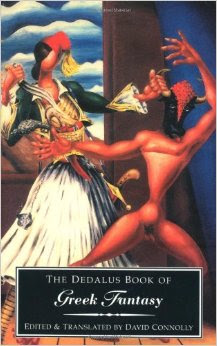"...when we arrive at the absolutely essential texts, when the information and narratives fashioning the suppression of needs have been disposed of and the lost knowledge returns, if nothing else at least we’ll know where we are going, what possibilities remain.” - "Nostalgic Clone", Amis M.
Last November I raided my university library in search for modern Greek fiction - and to my surprise, I wasn't disappointed. Finding literature or language books with the words "modern" and Greek adjacent to one another is like trying to find a movie rental store - it's nearly impossible. Among the several poetry volumes I collected, I did find one anthology of prose - the Dedalus Book of Greek Fantasy.
While I maintain that this entire book is a must have, the story "Nostalgic Clone" by Amis Marangopoulos is perhaps my favorite.
I first read "Nostalgic Clone" following an assignment on the "Library of Babel" by Gorges Luis Borges, and so perhaps it was the resounding library theme that caught my initial interest. This short story, originally published in Greek and translated by David Connolly, revolves around the writings of a clone named Ulmo, and his journey into the library, into nostalgia. His recollections immediately confront the reader with abstractions of the self and a fascinating, yet weak, contour of reality.
From Ulmo's perspective, the world is divided into Selves and Others, which is perhaps the clearest and most immediate connection the reader can make to our own world and how we view other people. Ulmo struggles to describe this reality against an interference, called auto-regulation, as the story continues. His descriptions of the Others shift from viewing them as stupid and impassioned to "nice and different" (243). The Selves are viewed as smart, with a large library and static. The Selves do not change. The Others, meanwhile, are unpredictable.
 |
| Book Cover. In Greek mythology, Dedalus crafted wax wings for himself and his son, Icarus, to escape a maze. |
This play on identity and perspective couples with the subtle mention of the society structure, composing of the "Biosphere" and the "Jukebox". In chapter one, Ulmo states that there can be no Biosphere without the Jukebox, and in chapter two, these concepts are better defined: the Biosphere is the world, and the Jukebox is the country. These two structures are completely engulfed by the hell-hole of a post-war era, while both Others and Selves search for a return to the "pre-war" times. In addition, this world and the clones that inhabit them are all to have been molded by Pan-Americanism, which adds a political commentary into the mixture.
The piece itself is short but dense. Although the style is easy enough to read, the abstraction of the setting and the characters can make it difficult to ascertain what's the story means. And this story is one of meaning, more than of plot - although the back story is certainly important. Its commentary may be off-putting for some, but I find that it is the overwhelming strength of the narrative, as it explores so many topics that need to be discussed such as distinguishing between belief and knowledge, between literature and information. The lines between fact and fiction are blurred, so much that even clones that must write only "required information" may also wander into writing poems (234). In dealing with how we process information, what information is, and what kind of information we have, this work dives into how we can understand out reality today. After all, in the digital age, we are over-saturated with information.
With skepticism and war, among other things, encoded into "Nostalgic Clone", it shouldn't be a surprise that it's a Post-Modern piece. Marangopolous has penned a work that is both thought-provoking and readable, that in its nature, encompasses more than just Greece, but is rather an exploration into the individual self and one's role in the community. If you want to read something that discusses the differences between information, people, and perspectives; if you want to read something with substance and entertainment, I suggest that you get your hands on "Nostalgic Clone", if nothing else.
But seriously, go buy the whole book. The collection is amazing.
Missed a NIE! Review? Check out Broken Glass Park!

No comments:
Post a Comment